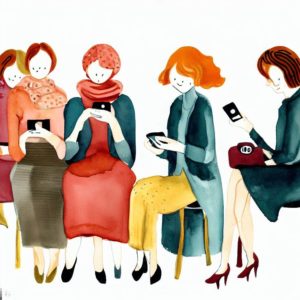
In today’s digital age, photos and social media have become an integral part of our lives. They capture moments, connect us with loved ones, and allow us to share our experiences. However, it’s important to recognize that these seemingly harmless aspects of modern life can sometimes have unintended consequences, particularly in the context of distanced family relationships. In this article, we will explore how photos and social media posts can inadvertently wound family members who are estranged or have strained connections. By understanding the potential impact, we can navigate these platforms more mindfully and work towards healing and reconciliation.
The Power of Photographs
Photographs hold immense power. They can transport us back in time, evoking a flood of memories and emotions. For individuals with distanced family members, photos can be both a source of joy and pain. They serve as reminders of cherished moments but can also bring about feelings of loss or longing.
Understanding Social Media Triggers
Social media platforms can amplify the impact of photos on distanced family members. Through our feeds, we often come across glimpses of the lives of those we have chosen to keep at a distance. These encounters can be unexpected and trigger a range of emotions. It’s important to remember that everyone’s journey towards healing is unique, and these triggers can affect individuals differently.
Navigating the Emotional Landscape
When confronted with triggering images, it’s essential to acknowledge and validate your emotions. Allow yourself to feel whatever arises, whether it’s sadness, anger, or a mix of conflicting emotions. Embrace self-compassion and understand that your feelings are valid and deserve attention. Consider seeking support from a trusted friend, therapist, or support group who can provide guidance and a listening ear during these challenging moments.
Finding Healing and Reconciliation
While photos and social media posts can wound, they also hold the potential for healing and reconciliation. It’s important to approach these platforms with intention and purpose. Here are some strategies to consider:
- Create Healthy Boundaries: Establish boundaries around social media usage and exposure to triggering content. Unfollow or mute accounts that consistently evoke negative emotions. Focus on cultivating a digital space that promotes healing and positivity.
- Engage in Self-Care: Prioritize self-care practices that help you navigate difficult emotions. This may include engaging in activities you enjoy, practicing mindfulness or meditation, journaling, or seeking professional therapy.
- Foster Open Communication: If you feel ready and comfortable, consider engaging in open communication with distanced family members. This could involve reaching out privately to express your feelings or seeking the support of a family mediator or therapist to facilitate conversations.
- Seek Professional Support: Online psychotherapy via webcam can be a valuable resource for individuals seeking guidance and healing in their family relationships. Professional therapists can provide tools, insights, and strategies tailored to your specific circumstances, empowering you to navigate complex emotions and foster reconciliation.
Embracing Growth and Moving Forward
Healing family relationships takes time and effort. It’s important to remember that everyone involved has their own experiences and perspectives. As you navigate the complexities of these connections, embrace personal growth and strive for empathy and understanding.
Celebrate Progress, Not Perfection
Healing family relationships is rarely a linear process. It’s important to celebrate small victories and progress along the way, even if it feels slow at times. Recognize that healing takes time, and setbacks may occur. Be patient with yourself and others involved in the journey.
Closing Thoughts
The impact of photos and social media posts on distanced family members is a multifaceted issue. By approaching these platforms mindfully and engaging in intentional actions, we can foster healing, empathy, and reconciliation. Remember, healing is a personal journey, and it’s essential to prioritize your well-being throughout the process.
As you embark on this path, surround yourself with a supportive community and seek professional help when needed. Together, we can navigate the complexities of family relationships and create spaces of understanding, growth, and love.







